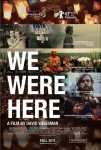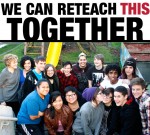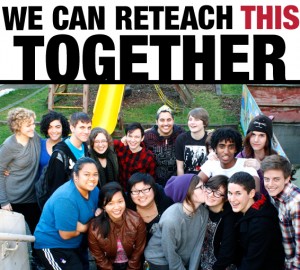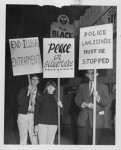|
|
  Adepero Oduye as Alike in Dee Rees' 'Pariah' We have finally entered an era where you can expect queer cinema to be as nuanced and insightful as any other, and Dee Rees’ Pariah, which opens in Portland theaters Friday the 13th, is the perfect example of a coming of age story done so well that it has, well, come of age.
Pariah follows 17-year-old African American Brooklynite Alike (Adepero Oduye) who lives at home with her younger sister and fairly strict and religious parents Audrey and Arthur (Kim Wayans and Charles Parnell). She is a good student and a writer who is struggling not so much with her sexuality, but how to reveal it and fully engage with it. She wants a girlfriend but is frightened. She has a supportive friend but her mother pushes that friend away. And while she is a bright and sympathetic protagonist, what is most powerful about this film is not that she is a superhero but rather a very real vision of what it’s like to be a contemporary lesbian teenager.
Continue reading »
  'Tomboy' Narratives about those crossing the gender spectrum, in whatever capacity, are just beginning to enter mainstream culture. I often find myself wanting to see more well-rounded, and dare I say happy portrayals of non-gender conforming people on screen. Tomboy, a French film by Director Céline Sciamma, does not paint a wholly a rosy picture, but it does portray the young child protagonist with compassion and sincerity.
Ten year old Laure is mistaken for a boy when she moves to a new town over summer break. She embraces it fully, going by the name Michael, taking her shirt off, and even fashioning a makeshift packy out of Play-Doh. The film delves into the parentless world of children on summer vacation very well. The kids are fully fleshed out characters that are quite adorable and smart, even as they are still juvenile and innocent.
Continue reading »
  One of Thursday night’s screenings for the PLGFF was Gun Hill Road by writer-director Rashaad Ernesto Green. The film opens with Enrique, a husband and father, returning home to the Bronx after three years in prison. During his absence he finds that the family he used to know has changed. Not only has his wife, Angela, had an affair with another man but his teenage son, Michael, has started to experiment with his gender identity. Michael dresses up as a woman and wants to have surgery to become fully transitioned. One of Thursday night’s screenings for the PLGFF was Gun Hill Road by writer-director Rashaad Ernesto Green. The film opens with Enrique, a husband and father, returning home to the Bronx after three years in prison. During his absence he finds that the family he used to know has changed. Not only has his wife, Angela, had an affair with another man but his teenage son, Michael, has started to experiment with his gender identity. Michael dresses up as a woman and wants to have surgery to become fully transitioned.
Although Michael never confronts Enrique about the transformation he wants to make, Enrique has suspicions and discovers it anyway. This challenges Enrique’s ideals about what it means to be a man and what it means for him personally to have raised a son that wants to be a woman. He deals with these challenges from his family and with the challenge of getting out of prison by becoming involved in the same kinds of skirmishes that probably put him in jail. Meanwhile, Angela struggles with breaking off her affair. Though she is supportive and protective of Michael, she seems somewhat oblivious to the transition Michael wants to make.
Continue reading »
  When I arrived in the rainy late afternoon to see PLGFF’s premiere of the German film, and first from Director Sabine Bernardi Romeos, to be released later this year it was not to a packed house. Organizer Gabriel Mendoza didn’t consider it one of the fest’s blockbusters, though he loved the film. Indeed, compared to the line around the block when I left for 7pm’s Weekend, it wasn’t. But it was a triumph. Small it may seem, but every review I’ve read thus far of the film following a young trans man struggling with life and attractions through his transition, has been celebratory, and I wholeheartedly agree. When I arrived in the rainy late afternoon to see PLGFF’s premiere of the German film, and first from Director Sabine Bernardi Romeos, to be released later this year it was not to a packed house. Organizer Gabriel Mendoza didn’t consider it one of the fest’s blockbusters, though he loved the film. Indeed, compared to the line around the block when I left for 7pm’s Weekend, it wasn’t. But it was a triumph. Small it may seem, but every review I’ve read thus far of the film following a young trans man struggling with life and attractions through his transition, has been celebratory, and I wholeheartedly agree.
Another common sentiment I share about the film is that the well-written story is carried off flawlessly by lead actor Rick Okon. Okon plays the 20-year-old Lukas who is “accidentally” put into the female form during his year of German service. He wants desperately to get out and just be one of the guys, even though it is here that he has a Ine (Liv Lisa Fries) an old best friend (former lover?), who is also an out lesbian. In her sexually fluid, but not necessarily trans-inclusive, group of friends, Lukas falls for alpha hottie Fabio (Maximilian Befort).
Continue reading »
  It’s hard to figure out where to start when meditating on the importance of We Were Here, a documentary by David Weissman. It was the premier movie of the Portland Gay and Lesbian Film Festival which was not only a bold move but an great start to a necessary conversation. Weismann’s film illuminates the social, personal, political and cultural issues of the AIDS epidemic in San Francisco. The film itself has a small scope and because of that scope- it is able to highlight the broader issues of this epidemic. Its characters: Ed Wolf- an AIDS activist and caregiver; Paul Boneberg- executive director of the GLBT Historical Society; Daniel Goldstein- a visual artist and founding President of Under One Roof; Guy Clark- a local queer florist based out of SF’s Castro District; and Eileen Glutzer- a nurse in the height of the crisis and feminist health care activist. Weismann’s focus on these characters and their personal experience allow the film a lot of depth that captures the profound personal stories that highlight a larger collective experience. It’s hard to figure out where to start when meditating on the importance of We Were Here, a documentary by David Weissman. It was the premier movie of the Portland Gay and Lesbian Film Festival which was not only a bold move but an great start to a necessary conversation. Weismann’s film illuminates the social, personal, political and cultural issues of the AIDS epidemic in San Francisco. The film itself has a small scope and because of that scope- it is able to highlight the broader issues of this epidemic. Its characters: Ed Wolf- an AIDS activist and caregiver; Paul Boneberg- executive director of the GLBT Historical Society; Daniel Goldstein- a visual artist and founding President of Under One Roof; Guy Clark- a local queer florist based out of SF’s Castro District; and Eileen Glutzer- a nurse in the height of the crisis and feminist health care activist. Weismann’s focus on these characters and their personal experience allow the film a lot of depth that captures the profound personal stories that highlight a larger collective experience.
Continue reading »
  Put This on the Map is a documentary featuring 26 different LGBTQ youth living in East King County. In the film the youth speak about what it means to be LGBTQ and discuss both gender expression and sexual orientation. One of the things I enjoyed most about the film was that youth from across the LGBTQ spectrum were included. We get to hear from youth that identify as trans, gender queer, bisexual, lesbian and gay. They talk about their experiences with bullying, their families, coming out, school, friends, their relationships, and their hopes for the future. Put This on the Map is a documentary featuring 26 different LGBTQ youth living in East King County. In the film the youth speak about what it means to be LGBTQ and discuss both gender expression and sexual orientation. One of the things I enjoyed most about the film was that youth from across the LGBTQ spectrum were included. We get to hear from youth that identify as trans, gender queer, bisexual, lesbian and gay. They talk about their experiences with bullying, their families, coming out, school, friends, their relationships, and their hopes for the future.
The film offers good basic information but is a little too after school special-esque. It doesn’t really delve into any specific topic as the experiences of so many youth are touched on.
Continue reading »
  I am is filmmaker Sonali Gulati’s coming out letter to her mother. Eleven years after her mother’s death, Sonali explores the possibilities of how her mother might have reacted to her sexuality by returning to her childhood home in New Delhi and gathering the coming out stories of Indian queers and their parents. I am is filmmaker Sonali Gulati’s coming out letter to her mother. Eleven years after her mother’s death, Sonali explores the possibilities of how her mother might have reacted to her sexuality by returning to her childhood home in New Delhi and gathering the coming out stories of Indian queers and their parents.
Some might think a film of coming out stories from a country which only decriminalized homosexuality in 2009 would be intolerably grim. But the film includes many heartfelt interviews with Indian parents philosophizing on parental acceptance, the meaning of unconditional love and the process of letting your children become who they are. Some of these parents showed real bravery to stick by their kids and to change their own expectations. They’ve challenged the expectations of their extended families and a society that is very focused on heterosexual marriage. Many are clearly still struggling with it, but there is a lot of love in this film.
Continue reading »
  Last night I took a friend who was visiting from New York to the airport. We got in a great philosophical conversation about whether gay rights are the inevitable result of a free society. At this point in history, it’s possible to view gay marriage and other advances as “just a matter of time”. The truth is there are people who faced police brutality, unemployment, societal rejection, and death to make this conversation even possible. There are people who still face these horrors, but that’s another film… Last night I took a friend who was visiting from New York to the airport. We got in a great philosophical conversation about whether gay rights are the inevitable result of a free society. At this point in history, it’s possible to view gay marriage and other advances as “just a matter of time”. The truth is there are people who faced police brutality, unemployment, societal rejection, and death to make this conversation even possible. There are people who still face these horrors, but that’s another film…
On These Shoulders We Stand puts us across the living room from a fabulous cross-section of the activists of the 50’s, 60’s and 70’s. There’s Ivy Bottini, founder and president of NOW New York. She was sacked when the term “Lesbian Menace” was coined.
There’s Dale Reynolds, the Hollywood leading man who founded Gay Actors RAP to fight homophobia in the film industry. Then there’s Reverend Troy Perry, founder of the Metropolitan Community Church who helped organize the first Pride Parade in L.A. a year after Stonewall.
Continue reading »
  It's hard to be pretty when being pretty makes you hard. The Adonis Factor, a film by Christopher Hines, is a look into the objectification and beautification inherent in the gay male world. Hines also brought us the movie, The Butch Factor. Both films discuss social and personal roles and image in gay culture. However, The Adonis Factor focuses more on beauty and image expectation.
I love queer documentary. I forget how narrow my perspective can be as a lesbian, and I’m always thrilled to find new beautiful pathways, and dark alleys in which to peek. I do kind of feel, that when I opened the door on this documentary, all that stood before me were boring pant suits. The emotional standpoint attempts to create empathy towards muscle ridden gay men, and remind us all that “beauty is a curse”. I can understand that breaking your back to reach a social expectation is grueling, but I’m not so sure sitting and watching an entire documentary on this one issue is eye opening.
I found the perspective narrow. Midway through, I got a sense that these men felt their pressure to work out and starve themselves was exclusive to them. There was an attitude that maybe straight people and other queer communities don’t have it quite as rough with pressure to be perfect. I did find some of the interviews to be interesting, but I couldn’t help that “I’ll give you something to cry about” feeling welling up inside me like an angry demon ready to devastate some carbs.
Continue reading »
 Nothing says I love you, like surgically adopting your lover's face. The Ballad of Genesis and Lady Jaye is a film by Marie Losier chronicling the relationship of Genesis P-Orridge and his wife Lady Jaye. Genesis took part in forming Throbbing Gristle, Psychic TV, and kickstarting the industrial movement. Lady Jaye was his love and collaborator. Epic romance and art were among their accomplishments… so was looking alike. Man, if you think you and your partner are codependent, check these two out! They met in a fetish dungeon, and spent years having plastic surgery to look more like one another. Basically, their one-ification was their gay baby.
Continue reading »
|
|



















